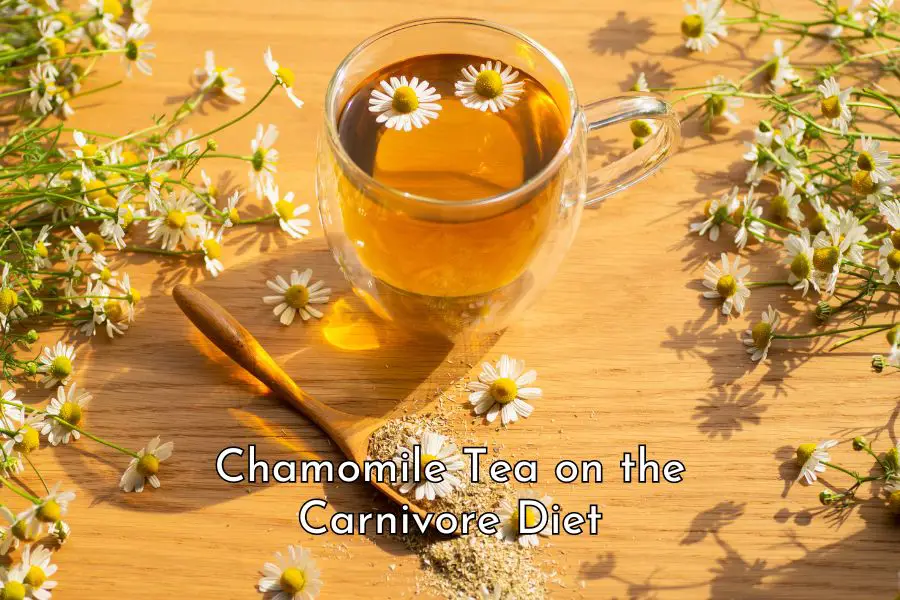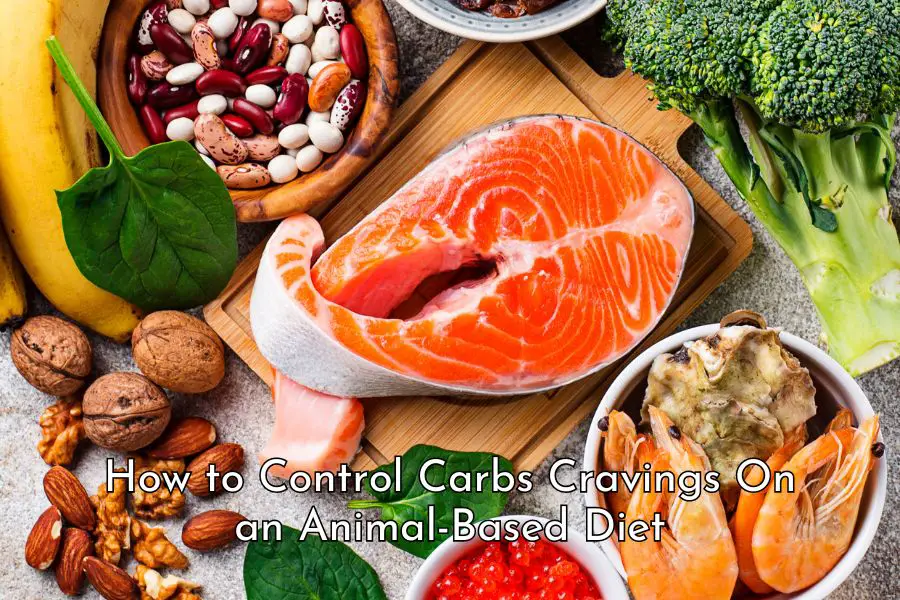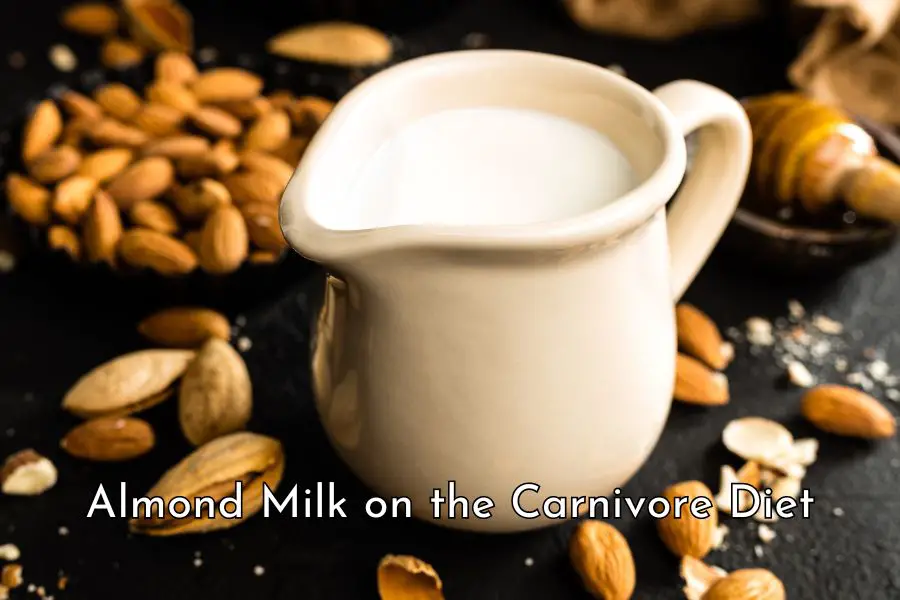What is the best cooking oil to use on the carnivore diet? Are butter and ghee okay? Can you still use coconut oil, olive oil, and avocado oil? What about MCT oil? This post will answer all of these questions for you.
However, first of all, I would like to emphasize that on the carnivore diet you are unlikely to have to cook a lot or use a lot of oil in cooking.
Meat tastes best with minimum cooking and meat itself already has some fat, from little to a lot depending on the type of cuts you get. You won’t need cooking oil at all if the meat has a lot of fat, but will need just a bit of oil to fry eggs, cook a very lean piece of meat or grease baking trays.
What is the best cooking oil on the carnivore diet?
The best cooking oil on the carnivore diet is ruminant fats because they are physiologically suited to our bodies, have better quality than other animal fats, and are free from anti-nutrients.
1. Ruminant fat are physiologically suited to our bodies
The human body is suited to a meat-based diet.
Evidence from human physiology and genetics, archeology, paleontology, and zoology points to the fact that our ancestors were hyper-carnivorous apex predators that ate mostly meat from large animals for 2 million years. [1]
They might have eaten some plant food now and then to survive but meat was mostly what they ate.
Despite rapid changes in the living environment, our genetic make-up virtually remains the same as that at the end of the paleolithic period. The human body today is still well-suited to a meat-based diet.
For example, the human stomach is even more acidic than carnivores, equaling that of scavengers indicating a meat-based diet in which the acid would provide protection from harmful bacteria. Humans also have longer small intestines and shorter large intestines which are typical of carnivores’ gut morphology and limit humans’ ability to extract energy from plants’ fiber. [2]
Furthermore, our ancestors ate mostly large herbivores and drove them to extinction. The closest you can get to large herbivores these days are cows, buffalos, bison, and elks, not pigs, chickens, or ducks.
Therefore, the most ancestrally consistent food that you can eat is ruminant meat and the best fats to eat are ruminant fats.
Other factors below further support the argument that animal fats are the best to eat or used in cooking on the carnivore diet.
2. Ruminant fats are of better quality than other animal fats
Ruminant fats are of better quality than other animal fats for the following reasons:
- Ruminants are better raised than pigs and poultry
- Ruminant fats have a lower level of polyunsaturated fats than pork and poultry
- Ruminant fats have better omega 6 to omega 3 ratio than pork and poultry fats
(i) Ruminants are better raised than pigs and poultry
Farmed ruminants such as cows still spend most of their lives outdoor and eat a diet relatively close to their natural diets. They typically spend a large part of their lives grazing before finishing on grains.
For example, cattle raised for beef graze on pasture until they are about 12 to 18 months old before being sent to a feedlot. They will spend about 4 to 6 months at the feedlot where they are fed a grain-based diet to accelerate weight gain. Grass-fed beef cattle will spend their whole lives on pasture. [3]
Pigs and chickens, however, generally spend their entire lives in crowded sheds or cages and are fed a composite diet that is very different from their natural diets.
Pigs raised for meat in factory-farmed operations generally spend their entire lives in barren crates or concrete pens so small that they have no room to turn around. They do not have outdoor access. Sows spend their reproductive lives confined to a small gestation crate. [4]
These pigs are fed a grain-based diet consisting of corn, soybean, wheat, barley, oat, and added vitamins and minerals. Because pigs are omnivores, a 100% plant-based diet is unhealthy for them.
Pigs in the wild will eat many things including small mammals, birds, reptiles, frogs, crayfish, eggs, earthworms and other invertebrates, and all parts of plants including the fruit, seeds, roots, tubers, bulbs and foliage. [5]
Similarly, poultry is also raised in poor conditions. For example, chickens raised for meat are raised indoors in large sheds at a high density of around 20,000 to 30,000 birds per shed. These chickens usually don’t have access to the outdoors and are likely to spend their entire lives in the sheds. [6, 7]
They are excessively fed grains and oilseed meals or animal by-product meals for fast unnatural growth. In 1925, it took 16 weeks to raise a chicken to 2.5 pounds (1.1 kg). Today, chickens weigh double that in just 6 weeks.
They are also given drugs to control parasites and low-dose antibiotics to prevent or treat diseases likely related to unhealthy living conditions.
(ii) Ruminant fats have a lower level of polyunsaturated fats than pork and poultry
Obviously, amongst other things, how animals are raised affects their meat and fat quality.
As can be seen in the table below, ruminant fats have a lower level of polyunsaturated fats than pork and poultry (note that different test samples will give different results, but this will give you an idea of their fat composition).
Beef and lamb fats have about 4% polyunsaturated fats (PUFAs) compared to 11% to 21% for chicken, duck, and pork fats.
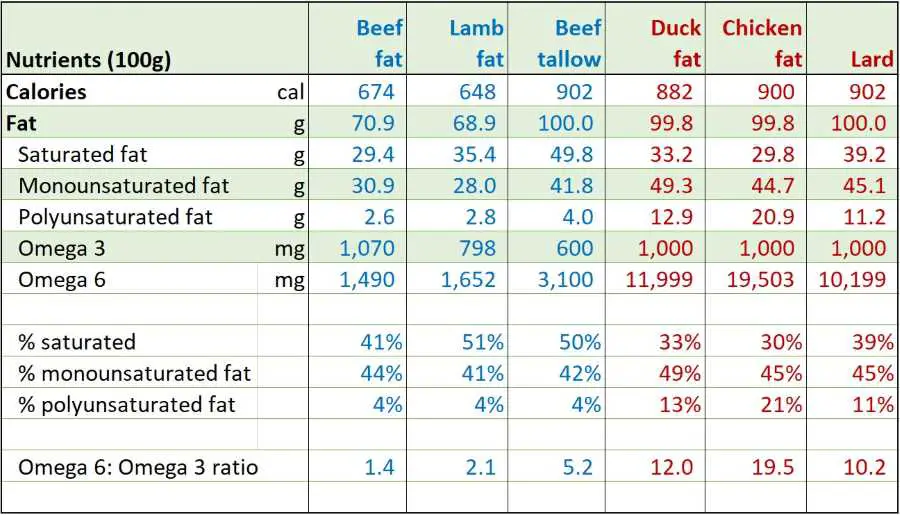
Let’s have a look below as to why consuming a lot of PUFAs is bad for you.
PUFAs are fats with more than one unsaturated carbon bond (double bond) in the molecule and are liquid at room temperature.
Due to their unstable chemical structure, PUFAs are prone to damage from high heat cooking, prolonged light exposure, and oxygen. Oxidized fats are inflammatory and linked to many modern health problems.[8]
PUFAs themselves are linked to many chronic inflammatory diseases such as nonalcoholic fatty liver disease, cardiovascular disease, obesity, inflammatory bowel disease, rheumatoid arthritis, Alzheimer’s disease, and cancer. [9, 10]
A randomized controlled trial called Sydney Diet Heart Study[11] conducted from 1966 to 1973 involving 458 men with a recent coronary event showed that “substituting dietary linoleic acid in place of saturated fats increased the rates of death from all causes, coronary heart disease, and cardiovascular disease“.
In particular, the intervention group that was advised to replace saturated fats with omega 6 linoleic acid from safflower oil and safflower oil PUFA margarine had higher rates of death than the control group.
Another study examining recovered data from a large randomized controlled trial[12] involving 9,423 participants over the 1968-1973 period found that the replacement of saturated fat in the diet with linoleic acid effectively lowers serum cholesterol but the high PUFA diet does not reduce the mortality risk. There was a 22% higher risk of death for each 30 mg/dL reduction in serum cholesterol.
(iii) Ruminant fats have better omega 6 to omega 3 ratio
As shown in the above table, ruminant fats like beef and lamb fats have much better omega 6 to omega 3 ratios of 1.4 to 5.2 compared to 10.2 to 19.5 for pork and poultry (again, please note that different test samples might give different results, but this will give you a good indication of their PUFA composition).
Ruminant fats have omega 6 to omega 3 ratios that are closer to what our hunter-gatherer ancestors consumed compared to pork and poultry.
Our ancestors are thought to have consumed omega 6 and omega 3 in the ratio of approximately 1:1, most people today consume far more omega 6 relative to omega 3. In the U.S., for example, the current intake data indicate that this ratio has blown up to approximately 10:1. [13]
Therefore, it is better to focus on ruminant fats for omega 3, especially if you don’t eat fatty fish regularly.
However, if you happen to find genuine pasture-raised pork or chickens, don’t hesitate to eat the fats or use them for cooking. I haven’t found information on the composition of pasture-raised chicken fats, but a small study found that pasture-raised pigs fed no grains had an omega 6 to omega 3 ratio of 5:1, similar to beef tallow’s ratio. [14]
(iv) Ruminant fats are high in saturated fats
Ruminant fats are high in saturated fats which are the best type of fats for cooking, especially high-heat cooking. This is because saturated fats are simple fat molecules that are completely saturated with hydrogen atoms.
Saturated fats are typically solid at room temperature. Because of their stable chemical structures, they are not prone to damage due to high-heat cooking, light exposure or oxygen.
You might have been advised to reduce saturated fat consumption because it causes cholesterol to build up in your arteries and increase the risk of heart disease.
This is a total myth. Available evidence shows that saturated fats do not clog up your arteries or raise the risk of heart disease or stroke.
A landmark systematic review and meta-analysis of observational studies showed no association between saturated fat consumption and (i) all-cause mortality, (ii) coronary heart disease, (iii) coronary heart disease mortality, (iv) ischaemic stroke or (v) type 2 diabetes in healthy adults. [15, 16]
In addition, a systematic review of 15 randomized controlled trials with 59,000 participants found no significant benefit from reducing saturated fats on heart attacks, strokes and all-cause mortality. [17]
3. Ruminant fats are free from anti-nutrients
Due to their animal sources, ruminant fats are also free from plant anti-nutrients.
Plants don’t want to be eaten and, as a self-defense mechanism, they produce toxins and anti-nutrients to deter predators and protect themselves.
Oils from plant sources, even the most organic and least processed ones are likely to contain some anti-nutrients that are bad for our health. Some of which are discussed further below.
Should you use butter and ghee on the carnivore diet?
Butter and ghee are animal source food, high in saturated fats and free from plant toxins, and are generally okay to use on the carnivore diet if tolerated.
Ghee is clarified butter with milk proteins removed so it can be a good choice for people who are dairy intolerant. Ghee has a high smoke point so it’s okay to use in cooking.
Butter tastes great but still has trace milk proteins in it. It also has a lower smoke point than animal fats and ghee so may not be best to use it in high-heat cooking and baking.
However, there is nothing in butter and ghee that you can’t get from animal fats.
Further, ruminant fats have a higher level of omega 3 compared to butter and ghee.
Unless you like the taste of butter or ghee, you don’t have to purposely add butter and ghee into your diet because you think they are healthy. Use animal fats in your cooking, they are nutritionally better and cheaper too.
If you have problems with dairy, gut, or autoimmune issues, it’s best to stay away from butter and ghee.
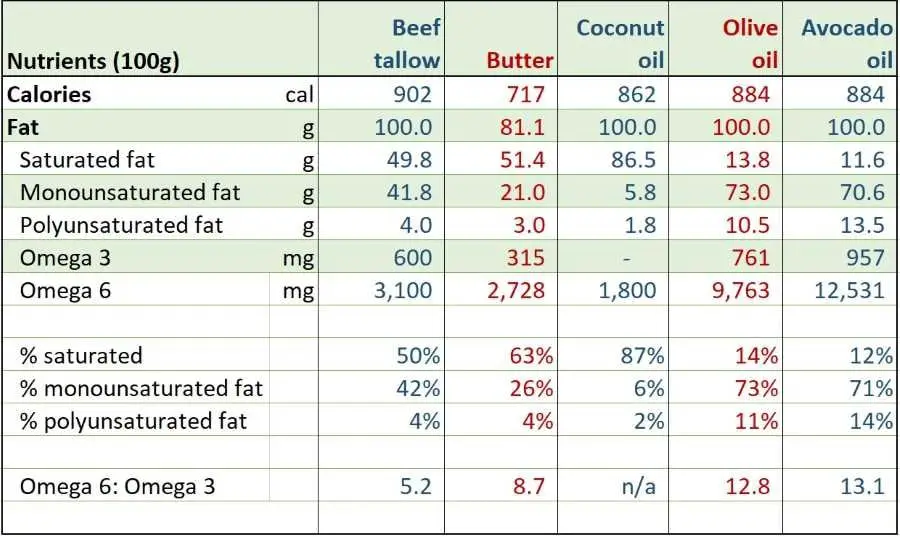
Should you use coconut oil on the carnivore diet?
Coconut oil is mostly saturated fat. If you have no problem with coconut oil, it is okay to use coconut oil on the carnivore diet for cooking.
As can be seen in the table above, 87% of coconut oil is saturated fats which are structurally stable and less susceptible to oxidation.
Coconut oil is also found to have some health benefits such as anti-inflammatory and antimicrobial properties, supporting weight loss, and improving antioxidant status. [18, 19, 20, 21, 22]
However, coconut has a moderate level of salicylates, a phenolic compound that plants produce to protect themselves. [23]
Some people can have salicylate intolerance and symptoms in those cases include headaches, migraines, respiratory irritation, gastrointestinal discomfort, irritability, joint pain, swelling and fluid retention, mouth ulcers, sore and itchy eyes, etc. [24]
If you are salicylate intolerant, it’s clear that you need to stay away from coconut oil. However, even if you haven’t had any problem with eating coconut and coconut oil, it’s best to consume them in moderation. It’s the dose that makes the poison. In addition, get the best type you can afford, preferably organic cold-press coconut oil.
From an evolutionary perspective, our ancestors certainly didn’t have access to coconut oil perhaps until the last few thousand years. What they might have done was drinking coconut water and eating coconut flesh when they happened to find coconuts.
So, if you like coconuts and don’t have any problem eating them, grab a coconut from the shop every now and then, drink the juice, and eat the white flesh. You don’t need to purposely go out and buy coconut oil and eat tons of it.
Should you use olive oil on the carnivore diet?
Olive oil is high in monounsaturated fat and is not as prone to damage as many industrial seed oils. If you don’t have any problem with olive oil, it is okay to use olive oil for low-heat cooking on the carnivore diet.
As can be seen in the above table, 73% of olive oil is monounsaturated fats which are fat molecules with one unsaturated double carbon bond. Because of this, they are more prone to oxidation than saturated fats.
Olive oil, even the cold-pressed type, can go rancid easily due to exposure to light, heat, and air. You often see olive oil being sold in darkened or green glass bottles to protect it from damage due to light exposure. But even so, after a few months, its quality begins to be affected by oxidization. [25]
Studies show that olive oil can withstand frying for 24 to 27 hours and heating at 360°F (180°C) for 36 hours. [26, 27]
Therefore, it seems to be okay to use olive oil for frying or cooking but personally, I wouldn’t want to use it in baking or roasting at high temperatures, especially if it’s been around your kitchen for a long period of time.
In addition, olives have salicylates which can cause serious health problems in some people as mentioned above. [28]
Black olives (ripe olives) are classified as having a moderate level of salicylates while green olives are classified as having a very high level of salicylates. Olive oil is usually made from both green and black olives. Therefore, if you have salicylate intolerance, it’s best to avoid olive oil.
In summary, if you don’t have any health issues eating olives or cooking with olive oil, it’s okay to use in moderation. Buy real cold-pressed olive oil in small quantities and store it in a dark place, out of direct sunlight.
Should you use avocado oil on the carnivore diet?
Avocado oil is high in monounsaturated fat and is not as prone to damage as many industrial seed oils. If you don’t have any problem with avocado oil, it is okay to use avocado oil for low-heat cooking on the carnivore diet.
Avocado oil is very similar to olive oil which is covered above. It is:
- High in monounsaturated fat so it is better than oils that are high in polyunsaturated fats but it is still more prone to oxidation than saturated fats
- Okay for frying, having a smoke point of 520°F (271°C). But note that it also has 14% of polyunsaturated fats which are very susceptible to heat, so to be on the safe side, stay with low heat and short-duration cooking
- High in salicylates and should be avoided for people with intolerance.
In short, if you don’t have any health issues eating avocadoes, it’s okay to use avocado oil for cooking. A better way would be just to eat a small amount of avocadoes when they are in season.
Should you use MCT oil on the carnivore diet?
MCT oil is commonly derived from coconut oil or palm oil. It comprises 100% medium-chain-triglyceride fats.
MCT oil is digested differently from other fats in that it goes straight from the gut to the liver where it is turned into ketones and used for energy.
MCT oil is a popular supplement due to its supposed health benefits such as weight loss, heart health, energy boost, digestion, and antibacterial properties.
In my view, it is best to stay away from MCT oil on the carnivore diet because:
- It is a processed oil. Your body is much better at handling whole unadulterated food than processed food. Animal fats like beef and lamb fats are wholefood
- It is pure fat and doesn’t contain a range of nutrients like animal fats. For example, beef fat has vitamin K, niacin, vitamin B12, vitamin B6, calcium, magnesium, phosphorus, potassium, sodium, zinc and selenium in small quantities
- It is a plant-based oil which can contain plant compounds that may be bad for your health in large doses
- It is inconsistent with our evolutionary roots, our ancestors would have never drunk pure fats. Okay, they didn’t have access to it but I don’t see any reason to drink fats. If you want to be in ketosis to lose weight, the carnivore diet is a great diet to help you lose weight and keep it off for good.
Conclusion
The carnivore diet is a very simple diet. You need very little cooking and don’t need to use much cooking oil at all.
The best cooking oil to use on the carnivore diet is ruminant fats. They are from better-raised animals with better nutritional profiles and are consistent with our evolutionary roots.
Butter and ghee are also okay if you can tolerate dairy.
Other cooking oils like coconut oil, olive oil, and avocado oil are okay if you don’t have issues with residual plant compounds in these oils.
That is only if you enjoy using these oils. You don’t have to go out and buy these oils for their anti-oxidant, anti-inflammatory, and polyphenol contents. Animal-based products have everything that your body needs. Animal fats are much better and a lot cheaper too.
Because at the moment, animal fats are shunned by people, eating animal fats is good for your health and at the same time helps reduce waste and support the environment.
If you find this post helpful, please consider sharing this post and my site with your family, friends, and followers. That would be much appreciated. Please also check out my library of articles on the carnivore diet here which is updated regularly.
Disclaimer: The information in this post is for reference purposes only and not intended to constitute or replace professional medical advice. Please consult a qualified medical professional before making any changes to your diet or lifestyle.
Photo credit: Megumi Nachev on Unsplash


